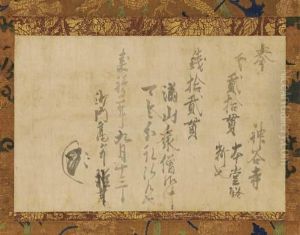Myoe Koben Paintings
Myoe Koben, also known as Myoe Shonin, was a prominent Japanese Buddhist monk of the Kegon school during the Kamakura period (1185–1333). He was born in the province of Kii (present-day Wakayama Prefecture) to a family with aristocratic connections. Myoe was orphaned at an early age and subsequently adopted by a temple where he began his religious life.
Myoe's education was rooted in Buddhist teachings, and he eventually became a disciple of the eminent monk Jokei. He was deeply influenced by his teacher's devotion to the Lotus Sutra and the Kegon school, which is the Japanese transmission of the Huayan school of Chinese Buddhism. Myoe is best known for his efforts to revive the Kegon school, which had declined in influence by his time, and for his prolific writings.
He resided at Kozan-ji, a temple located in the Toganoo mountains northwest of Kyoto, which he helped restore. It was there that he wrote extensively, producing a vast corpus of diaries, commentaries on sutras, and religious poetry. Myoe's diaries are particularly valuable for their detailed account of religious practices and the daily life of a Kamakura-period monk.
Myoe was also known for his ascetic practices and his commitment to upholding the precepts of Buddhism. He undertook rigorous religious disciplines and was known for his dedication to teaching and helping others. His legacy includes not only his writings but also the influence he had on his contemporaries and on the generations of monks that followed.
Myoe Koben passed away in 1232 at the age of 59. Although the Kegon school did not regain the prominence it once held, Myoe's efforts ensured its continued existence and the preservation of its teachings. Today, he is remembered as one of the most significant figures in Japanese Buddhism during the Kamakura period. His teachings and writings continue to be studied by those interested in Japanese religious history and Buddhism.
